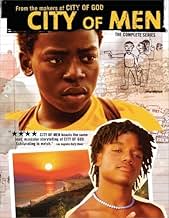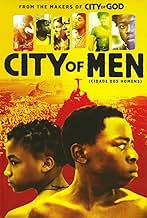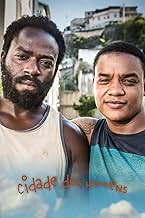Ajouter une intrigue dans votre langueA realistic yet humorous look at the lives of Laranjinha and Acerola, two friends who live adventurous and dangerous lives in a Rio de Janeiro slum.A realistic yet humorous look at the lives of Laranjinha and Acerola, two friends who live adventurous and dangerous lives in a Rio de Janeiro slum.A realistic yet humorous look at the lives of Laranjinha and Acerola, two friends who live adventurous and dangerous lives in a Rio de Janeiro slum.
- Prix
- 3 victoires et 3 nominations au total
Parcourir les épisodes
Histoire
Le saviez-vous
- AnecdotesThis series is based on the short Palace II (2000) in which Darlan Cunha played Acerola and Douglas Silva played Laranjinha. In this series, Cunha played Laranjinha and Silva played Acerola.
- ConnexionsFeatured in Cidade dos Homens (2007)
- Bandes originalesO Vencedor
Performed by Los Hermanos
Commentaire en vedette
First things first, this series is not a continuation of the story of the film City Of God, but covers similar themes. Many of the actors are in both (Douglas Silva, for example played Ze Pequeno in the film, and plays Acerola, one of the two protagonists in the series). No matter what anyone says, the series will always be compared to film.
But I feel that the series explores the favela culture in far more depth than the film. One particularly good episode is 'Uólace and João Victor', where Laranjinha's troubles living in the favela are compared to those of a middle class 'playboy' Joao Victor. The episode explores their problems with girls, crime, friends, parents, food, school, race etc. and ultimately concludes that their adolescent lives really aren't all that different, even though their surroundings are. There is a really nice scene at the end of the episode when one is walking the streets, and the other is looking out the window. They look at each other and both think "That boy looks so lonely".
Many of the episodes take place out of the favela, bringing a whole new aspect to the culture. How are black/favela kids perceived by the rest of society? What is school like for them? Is it even possible for them get a decent education? Are they all thieves and bandits, or just hungry and desperate? Say one wants to leave the favela drug business, is it possible for them to leave and get a 'normal' job? Although inevitably glamourised somewhat, the series is a great look into Rio life, shot beautifully with many interesting techniques used - montage, voice-over, animation, pans, subjective camera-work are all used to recreate the lifestyle. Another ace scene is in the final episode when one bandit is running from the police, dodging in and out of alleys in the favela. The camera switches to a natural, overhead view, and we see what the bandit sees, as he glances down possible routes to make his escape.
I think that the most interesting scene is when there is a particularly violent event, and the shot merges into real life interviews with the kids about their lives in the favela. As they brag about various violent scenes they have witnessed in real life, it becomes clear that the brutality in the series is not all that far fetched. Many of the young actors in the film and series were picked from the favela by the director and just told to act how they would naturally when presented with, say, a drug deal or a murder.
The series is into is fourth of fifth season in Brazil, so here's hoping for an international release soon...
But I feel that the series explores the favela culture in far more depth than the film. One particularly good episode is 'Uólace and João Victor', where Laranjinha's troubles living in the favela are compared to those of a middle class 'playboy' Joao Victor. The episode explores their problems with girls, crime, friends, parents, food, school, race etc. and ultimately concludes that their adolescent lives really aren't all that different, even though their surroundings are. There is a really nice scene at the end of the episode when one is walking the streets, and the other is looking out the window. They look at each other and both think "That boy looks so lonely".
Many of the episodes take place out of the favela, bringing a whole new aspect to the culture. How are black/favela kids perceived by the rest of society? What is school like for them? Is it even possible for them get a decent education? Are they all thieves and bandits, or just hungry and desperate? Say one wants to leave the favela drug business, is it possible for them to leave and get a 'normal' job? Although inevitably glamourised somewhat, the series is a great look into Rio life, shot beautifully with many interesting techniques used - montage, voice-over, animation, pans, subjective camera-work are all used to recreate the lifestyle. Another ace scene is in the final episode when one bandit is running from the police, dodging in and out of alleys in the favela. The camera switches to a natural, overhead view, and we see what the bandit sees, as he glances down possible routes to make his escape.
I think that the most interesting scene is when there is a particularly violent event, and the shot merges into real life interviews with the kids about their lives in the favela. As they brag about various violent scenes they have witnessed in real life, it becomes clear that the brutality in the series is not all that far fetched. Many of the young actors in the film and series were picked from the favela by the director and just told to act how they would naturally when presented with, say, a drug deal or a murder.
The series is into is fourth of fifth season in Brazil, so here's hoping for an international release soon...
- ozthetouchdownboy
- 2 févr. 2006
- Lien permanent
Meilleurs choix
Connectez-vous pour évaluer et surveiller les recommandations personnalisées
- How many seasons does City of Men have?Propulsé par Alexa
Détails
- Date de sortie
- Pays d’origine
- Site officiel
- Langue
- Aussi connu sous le nom de
- City of Men
- Lieux de tournage
- sociétés de production
- Consultez plus de crédits d'entreprise sur IMDbPro
Contribuer à cette page
Suggérer une modification ou ajouter du contenu manquant

Lacune principale
By what name was Cidade dos Homens (2002) officially released in Canada in English?
Répondre





























